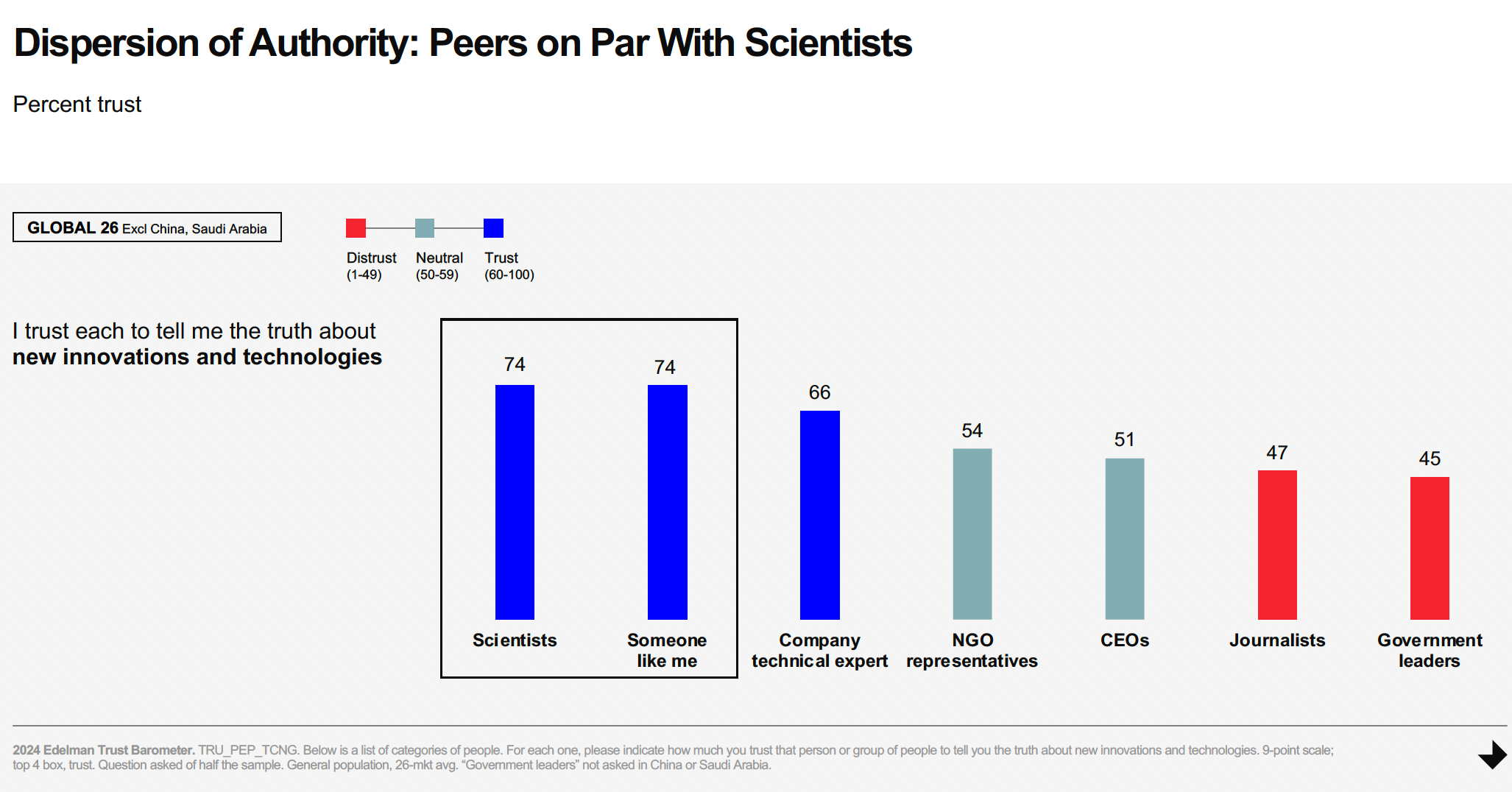Trust Barometer - scientists slug it out with people like me
Scientists have unwittingly found themselves at the heart of the battle for our hearts and minds, according to international PR firm, Edelman’s 2024 Trust Barometer.
This annual survey is entering its 25th year and, whether you’re fully subscribed to its accuracy, methodology, validity or not, it never fails to stoke new lines of thought and conversation about our faith in those who lead and inform us.
The headline declaration from the 2024 report is that public sentiment indicates this will a year of ‘Innovation in Peril’. But what caught my eye was the line-ball scores for ‘scientists’ and ‘people like me’ as our most trusted sources of information.
Scientists share top billing with ‘people like me as trusted sources of information. Both are considerably head of institutions, including NGOs, with media and government rating lowest on trust. Of course, some scientists are employed by NGOs and may be company technical experts. These overlaps are unclear.
This is a result that intuitively aligns with what we are witnessing in our social media streams on headline issues like climate change, alternative energies like nuclear and renewables, personal health and nutrition … the list goes on.
For some, scientists are driven by shadowy funders and political agendas and therefore untrustworthy while others urge our focus on the evidence-based arguments derived from the rigour of scientific examination and modelling.
You could argue the 2024 findings are a natural evolution from the central tenet of the 2023 Trust Barometer that people were challenged by ‘Navigating a polarised world’,
Scientists now sit at one of those poles. They will become pivotal to our assured navigation through some some of the biggest challenges of our time.
Their success - our success - will mean overcoming, without disrespect, the influence of a mostly uninformed ‘people like me’ cohort backed by populist politicians and others whose futures are invested in misinformation and disinformation.
This will not be easy. Science is elite knowledge and scientists will need to craft their message and perceptions if they are to avoid being classified and vilified as ‘the elite’, which makes them different from ‘people like me’. It is a real and present danger in an era where the political landscape and personal fortunes have been shaped and defined by this division.
The 2024 Edelman Trust Barometer identified four headline areas of innovation by which to gauge public attitudes towards trust in innovation: Green energy, Artificial Intelligence; Gene-based medicine; Genetically modified foods.
These are the big picture and readily identifiable mega-streams of innovation. They are certainly those that attract most headlines.
They are fields heavily reliant upon technological innovation. But community acceptance of these massive technical changes will also require their buying into associated socio-economic transformation.
The Edelman Trust Barometer notes that ‘across institutions, listening is a top 3 trust-building action’: “To be trusted with innovation, give me a voice.”
Looking ‘like me’ is a matter of empathy and language - answering the ‘what’s in it for me?’ questions. Insights into conversation entry points should be informed by listening.
This enables better choices about language, timing interventions in public conversation and more effective participation in popular and accessible communications channels. Engagement and influence must be strategic.
Scientists will need to step outside the narrow confines of their specialisations, understanding that earning public support for a sustainable future based on best-practice involves much more than the adoption of innovative technology. It also means substantially shifting social perception and prioritisation to achieve a sense of inclusion across the political and socio-economic spectra.
People are experiencing an on-going struggle with a more polarised world. Within it, deliberate misinformation and disinformation by peers and even some mainstream media is accentuating confusion and a feeling of diminished personal control of the future.
Innovation itself is both empowering and alienating - offering huge opportunity and, for some, existential threat. The boundless potential of technological advancement - improved quality of life and longevity, minimisation of mundane and repetitive work, plentiful and more nutritous food, there are psychological corollaries.
Some of the underpinning data supporting Edelman’s assertion that innovation is in peril in 2024. The politicisation of Green Energy and the associated emergence of the nuclear debate in places like Australia may also make support for renewables less definitive in the future.
Climate change and its symbiotic twin, biodiversity loss, conjure dystopian landscapes, artificial intelligence the loss of income and economic security, genetically engineered food the risk of unknown health and environmental impacts.
Scientists have a massive responsibility to use growing trust and influence to guide us on the best path forward. This will be essential to assuring future generations of access to a greater quality of life, of the physical and spiritual wellbeing derived from a healthy, biodiverse environment and of the benefits flowing from ever-growing human knowledge, insight and capability.
Photo: Mika Baumeister on Unsplash


